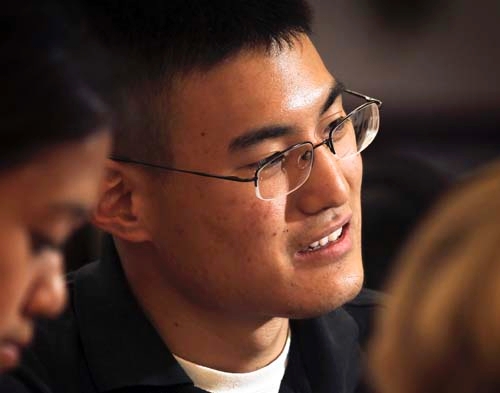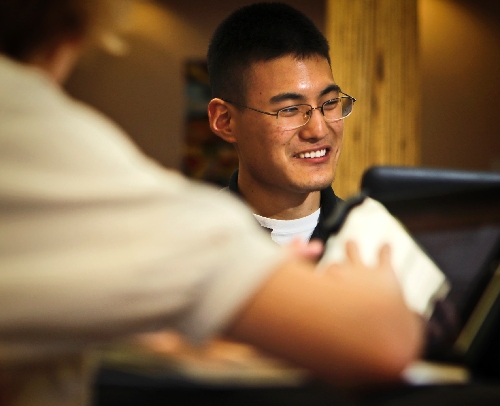Las Vegas National Merit semifinalist finding his way



Jason Kim chuckles at the one B allotment he gave himself at the beginning of high school. But he couldn’t do worse than his older sister, now attending medical school at Loma Linda University.
"Of all things, computer science," he says of his sister’s lone B, her white whale.
But Jason blew his wiggle room first semester of freshman year.
English, final grade 89.4 percent.
"I have zero lives. The health bar is flashing red," he says four years later, recalling his dismay at being short of an A by sixth-tenths of 1 percent.
But the letter doesn’t haunt this tall, lean teen, sporting a militarylike whitewall haircut.
"That one B did more for me than any A’s in high school," says Kim, an introspective and self-effacing senior who would never admit that he is Faith Lutheran’s only National Merit semifinalist. The title is given to 1 percent of America’s high school seniors for their top-of-the-top PSAT scores.
The PSAT, co-sponsored by the College Board and National Merit Scholarship Corp., is a standardized exam that measures critical reading skills, math problem-solving skills and writing skills.
The rest of his high school grades turned out to be As. But that B made Jason re-evaluate his goals.
His dad, David Kim, is a private-practice doctor. His 24-year-old sister, Lisa, and 21-year-old brother, John, are studying for the medical field. His 14-year-old brother, Andrew, is heading in that direction as well.
But not Jason, which is fine with his mother, Youngmee Kim, who doesn’t believe in the common Korean custom of children following their parents.
"I stood aside and let them find out their ways," says Youngmee Kim, who immigrated to America with her husband before Jason was born.
"For some reason, medicine appealed to them all but Jason. Jason is creative. He wants to make something out of nothing."
She remembers Jason’s fifth-grade math teacher telling a story of the time he handed a problem to students. "Everyone goes the same direction to find the answer. Jason goes in the opposite direction but finds the answer."
So, what does Jason want to do?
"I’d like to study mathematics or physics," he says. "Or economics. Or computer science."
He is undecided but talks most passionately about theoretical physics, a field he stumbled onto two years ago because of one library book. Theoretical physics attempts to explain the most confounding natural phenomena, such as the shape of the universe, whether there are other dimensions beyond the four we know, and the existence of dark matter, which is hypothesized to account for a large part of the total mass in the universe but doesn’t emit or absorb light.
"I never thought about the big picture like that. I felt small, microscopic but at the same time important because everything down to the microscopic, cellular level is important."
Heavy stuff for an 18-year-old, he realizes.
"Of all the scientific fields, I start with the toughest," Jason says and chuckles, as he often does in the uneasiness of talking about himself.
But he is starting to have confidence in his potential, which his parents saw in him all along.
"When I was named a semifinalist, it was the first time I had hope I could do something awesome," says Jason, who applied to a dozen Ivy League schools but was disheartened by rejection letter after rejection letter. "The day I was accepted by Yale, I got four other rejection letters."
He thought Yale must have made a mistake. But one of the country’s most picky schools picked him.
"I have faith in Jason," his mother says.
"He’ll find his way."
Contact reporter Trevon Milliard at tmilliard@review journal.com or 702-383-0279.












